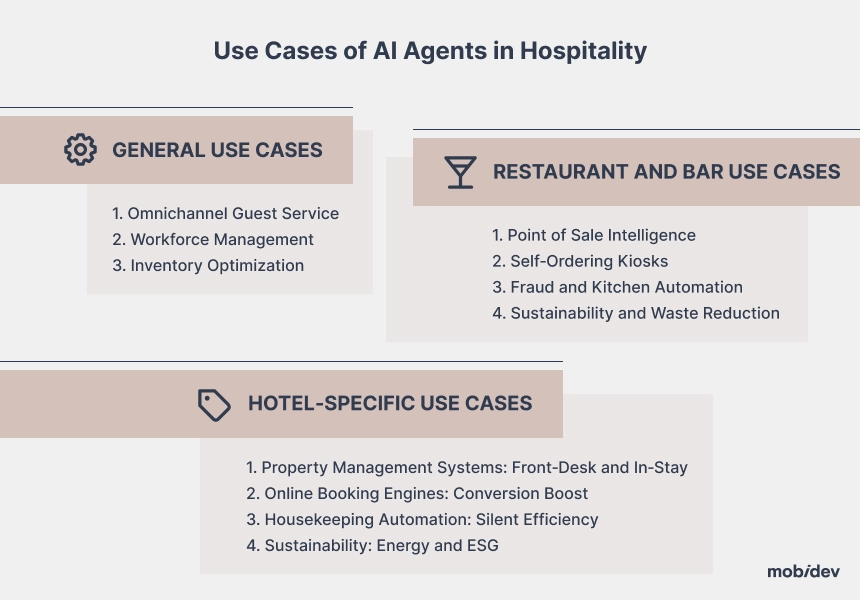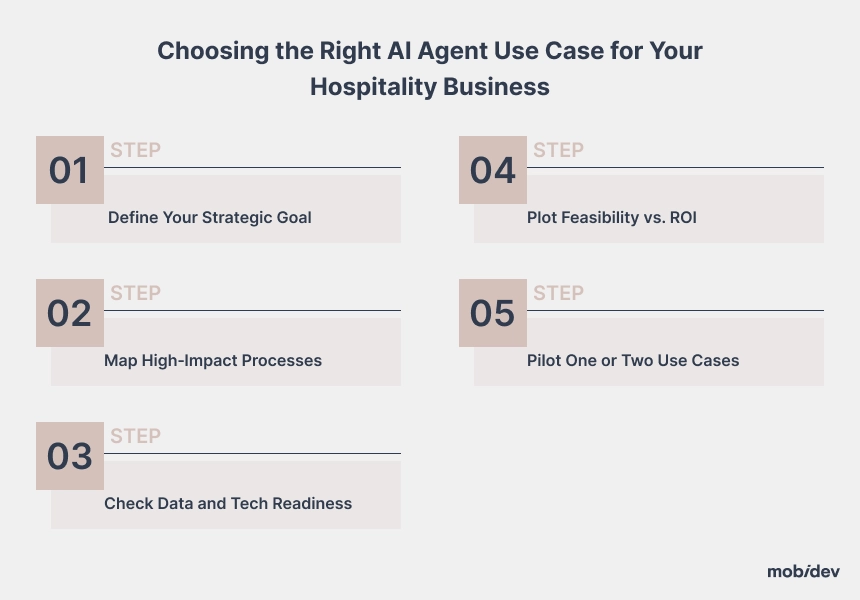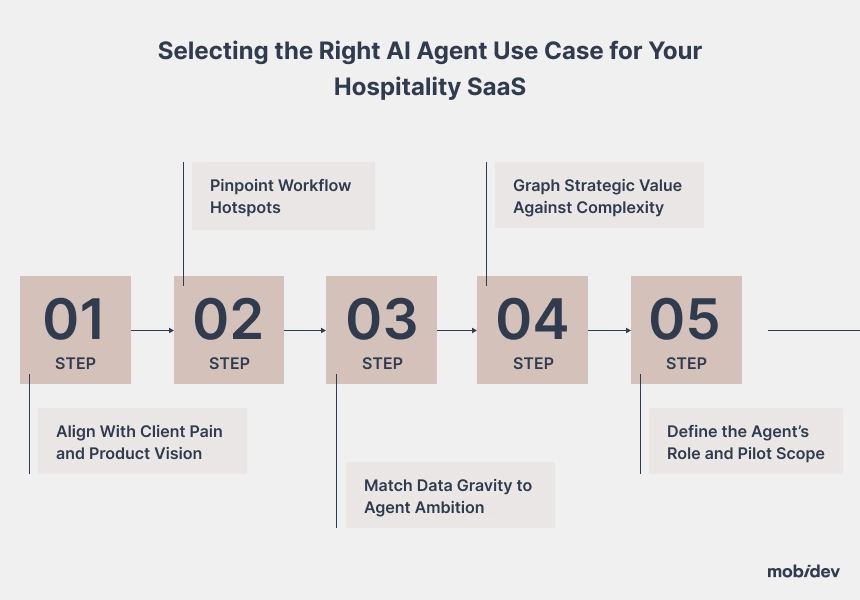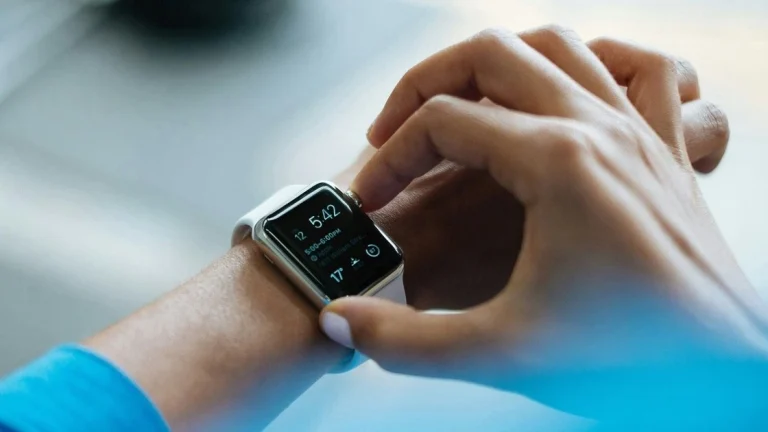Contents:
Artificial intelligence is no longer science fiction in hotels, restaurants, and SaaS platforms that serve them. You see chatbots greeting guests on a booking site, voice assistants answering questions in the lobby, and data‑hungry algorithms nudging diners toward the chef’s special. What matters now is understanding which of these AI agents does more than look cool. You need clear proof that the software lowers costs, boosts satisfaction, and grows revenue—without forcing a rip‑and‑replace of everything you already run.
My name is Iurii Luchaninov, and I’m a Solutions Architect with more than 20 years of experience turning complex architectures into reliable products. In this guide, I’ll draw on hands-on projects to show where AI agents already deliver measurable value in hospitality and help you figure out how to decide which use case should come first for your business.
From a hotel chain with an internal property-management system (PMS) to the provider of restaurant management systems (RMS), from a kitchen automation startup, to the mid-sized provider of a SaaS POS, the same question pops up in every boardroom: “Where do we start, and how soon will we see a return?” Indeed, before initiating a long-term hospitality software product development that will cost your businesses significant resources, it’s critical to understand where the biggest value lies. That’s where this guide comes in handy.
Rather than offering a soup-to-nuts development roadmap, it zeroes in on real-world use-case patterns, illustrating why the specific problem you tackle first will shape every downstream product decision. By the end, you’ll have a clear framework for matching AI capabilities to high-impact pain points, setting the stage for a successful pilot and long-term growth.
The Rising Tide of Personal AI Agents — Why You Need to Act Now
Last May, Google CEO Sundar Pichai called a universal AI agent “the north star we’re aiming for,” setting the tone for the industry’s next sprint. Analysts now predict that by 2025, personal digital assistants will handle room, table, and amenity bookings end-to-end, skipping today’s intermediaries. If a guest’s pocket bot comes straight to your booking API, will you be ready to reply? Wait too long, and your inventory may vanish behind competitors who already expose agent-friendly endpoints.
Early movers will gain direct relationships, fatter margins, and behavioral data that was once trapped inside third‑party platforms. Laggards risk being relegated to price‑driven marketplaces where brand equity erodes. Your playbook should therefore run on two tracks: deploy inward‑facing agents that tighten operations today, and publish outward‑facing endpoints that external personal agents can consume tomorrow.
Technology adoption rarely decelerates. Moore’s Law may be bending, yet model capabilities still leapfrog every six months. Guests who chat with GPT‑style devices at home will judge hospitality brands by the same yardstick. An hour saved today becomes next summer’s economic moat.
AI Agents in Hospitality: The Basics
Artificial intelligence that acts on your behalf is often called an agent because it combines perception, reasoning, and execution. Think of an AI agent as a digital staff member that never sleeps, never forgets, and scales instantly when guest volume spikes. Hotels deploy one agent at reception to handle check‑in, while another works in the background, predicting which rooms need housekeeping first. Restaurants run agents in POS systems, suggesting side dishes, adjusting dynamic pricing, and flagging suspicious voids. SaaS vendors, meanwhile, wrap agents inside APIs so clients gain new features without rebuilding their stacks.
Like any worker, an agent needs clear duties and the tools to carry them out. That means data access, domain knowledge, and a framework for safe actions. If the task is guest messaging, the agent must pull booking details, room preferences, loyalty tier, and available upsells. If the task is inventory forecasting, it needs historical sales, seasonal patterns, and supplier lead times. The reach of an agent only grows once you plug it into multiple channels—web chat, WhatsApp, voice IVR—creating an omnipresent helper that feels “always on” to your guests.
Quick Overview of the Agentic AI
The term “agentic AI” describes systems built around autonomous goals rather than isolated predictions. Instead of returning a single answer to a single query, an agent plans a sequence—observe, decide, and act. You can dive into the fundamentals in the article on agentic AI, yet the gist is simple: task‑oriented loops give better business value than one‑off chat replies. For hospitality, that loop might run each time a guest books, stays, and reviews, creating a lifelong dialogue that increases lifetime value.
Large language models (LLMs) supercharge agentic design because they interpret unstructured text, voice, and even documents. A front‑desk agent backed by an LLM understands “My flight lands at two in the morning, can I get early check‑in?” then cross‑checks rules in your PMS before confirming. The same foundation can parse public reviews, cluster sentiment, and spit out weekly reports for managers who prefer human‑readable summaries over spreadsheets.
Top 10 Benefits of AI Agents for the Hospitality Industry
Hospitality technology has evolved. A decade ago, you needed a call center or extra clerks to stay competitive; now, a cluster of agents delivers equal or better coverage at a fraction of the cost. Though you still need human supervision over the AI work, results ripple across guest experience, staffing, and finance:
- 24/7 Guest Service – Agents answer across time zones and languages, trimming late‑night payroll and eliminating missed inquiries, though a human-in-the-loop remains key for quality control.
- Lower Operational Costs – Repetitive tasks vanish; one agent can replace hours of phone or desk work during peak periods.
- Improved Satisfaction – Faster replies and personalized suggestions push review scores up, feeding the referral loop.
- Smarter Upselling – Agents drop context‑aware offers—late checkout, spa access, or a newly launched dish or limited-time special—right when guests are most receptive.
- Consistent Delivery – Software never has a bad day, ensuring brand standards hold across properties.
- Real‑Time Insights – Continuous data collection turns service gaps into instant alerts, not quarterly surprises.
- Better Staff Productivity – Freed from FAQ duty, employees handle VIPs and complex issues that AI should never touch alone.
- Scalability Across Locations – Deploy one trained agent to a new branch in hours, not weeks of onboarding.
- Multilingual Reach – Automatic translation lowers friction for international travelers and diners.
- Brand Differentiation – Early adopters look modern and responsive, winning share from slower competitors.
These advantages echo the numbers: 68% of consumers are prepared to act on Gen AI recommendations, and early hotel trials show higher engagement and booking conversion when LLM‑driven persuasion cues are present.
Real‑World Impact of AI Agents on Hospitality Businesses
When you integrate an AI agent into a live operation, the results hinge on three levers: data quality, workflow fit, and success metrics. Feed an LLM two years of structured guest messages and it can handle a majority of routine questions on WhatsApp or web chat, driving average response time from “minutes” to “moments.”
That speed alone lifts satisfaction scores because guests feel heard instead of queued. Pair the same agent with your PMS or RMS and it can surface relevant upsell offers—late checkout for early arrivals, spa slots for loyalty members, or chef’s specials for returning diners—turning every conversation into a revenue opportunity without extra strain on front‑desk staff.
Add an upsell agent to a self-ordering kiosk, and the moment its recommendations become context-aware, your average cart value jumps. The agent monitors inventory, suggests high-margin bundles, and skips dishes that have just been 86’d in the kitchen, giving you bigger checks, fewer stock-outs, and cleaner reporting because every transaction is already captured in the POS.
Meanwhile, a feedback‑response agent inside a SaaS dashboard drafts post‑stay review replies in multiple languages. Community managers spend their energy on nuanced cases rather than copy‑pasting “thank you” notes, and your brand shows up as responsive on public platforms—a factor known to boost future bookings.
Across all these scenarios, the pattern for improvement stays consistent: start with a single pain point, connect your existing data pipes, and define KPIs before the project kicks off. Once the pilot moves the needle—be it faster replies, higher average spend, or leaner back‑office workload—you expand the agent’s remit or spin up a second one. Clear scope and measurable goals keep budgets tight and gains visible to every stakeholder.
4 General Use Cases of AI Agents in Hospitality
Between hotel suites and bar stools sits a spine of enterprise software—ERP, POS, WFM—that keeps the lights on. Injecting AI agents into these layers magnifies the impact because improvements ripple through every transaction. Consider three high‑leverage zones:
1. Omnichannel Guest Service
One conversational agent follows a traveler from website inquiry to in‑house tablet to post‑stay SMS. Because context syncs across channels, the guest never repeats information, and staff view a unified thread instead of hunting separate logs.
2. Workforce Management
An AI scheduler predicts demand, reviews employee availability, and drafts shifts compliant with labor laws. Managers simply fine‑tune the plan instead of building it from scratch, dramatically reducing manual scheduling effort while helping curb overtime penalties.
3. Inventory Optimization
A back‑office agent compares historical consumption, upcoming bookings, and supplier lead times to trigger purchase orders at the ideal moment. The same logic spots shrinkage patterns, flagging potential theft or waste before it erodes margins.
These tasks once demanded spreadsheets and human vigilance; now a trained model and a decision rule run them continuously, surfacing only the exceptions that merit human judgment.
4. AI Ordering Agents (Omnichannel Chat, Voice & Kiosk Ordering)
An AI ordering agent is a multilingual, NLP/Generative AI-driven concierge that lives in chat bubbles, voice IVR, QR menus, and self-service kiosks. The same intelligence now powers AI phone ordering agents, so even customers who dial in experience natural, mistake-free dialogue. Because the voice channel is managed by the same brain that drives chat and kiosks, menu updates, promos, and upsell logic propagate instantly across every touchpoint.
It parses free-form requests like “Two spicy margaritas, one without salt,” auto-clarifies modifiers, and pipes the finalized ticket straight to the POS and kitchen screens—zero rekeying, zero delay. Around-the-clock availability means guests can order whenever inspiration strikes, while natural dialogue removes language or accessibility barriers. Real-time analytics let the agent suggest pairings, specials, or upgrades that lift average spend. Every order feeds a data loop that spotlights hero dishes, peak demand slots, and waste points, guiding staffing, pricing, and inventory decisions. By offloading repetitive order taking, staff stay focused on hospitality and craft—transforming the ordering moment from a bottleneck into a profit and insight engine.
Top 4 Hotel‑Specific Use Cases of AI Agents for Hospitality
Hotels juggle arrivals, rooms, amenities, and feedback. AI agents slot neatly into each stage of the guest journey and the back‑end tasks that support it.
1. Property Management Systems: Front‑Desk and In‑Stay
An AI front‑desk agent plugs into your PMS and handles early check‑in, late checkout, and room changes. When a VIP arrives, the agent cross‑references loyalty status and prompts staff to offer an upgrade. During the stay, the same agent books spa appointments and pushes real‑time maintenance tickets to engineering—guests interact via chat; workers receive structured tasks in their own apps.
2. Online Booking Engines: Conversion Boost
A conversational agent replaces static forms on your direct‑booking site. It answers policy questions, compares room types, and can recover abandoned carts by pinging the shopper on email or Telegram with a pre‑filled itinerary. Hotels that ran A/B tests saw direct bookings rise because visitors felt guided rather than sold.
3. Housekeeping Automation: Silent Efficiency
A housekeeping coordinator agent watches checkout times and flight delays to reshuffle cleaning priorities. Rooms flip faster, and guests rarely wait in the lobby. Post‑clean surveys go out automatically; negative feedback triggers an escalation ticket so management responds before reviews hit public platforms.
4. Sustainability: Energy and ESG
An energy‑saving agent connects to smart thermostats, shutting blinds and tweaking HVAC depending on occupancy. At checkout, a guest receives a brief report showing how linen reuse cuts water usage, turning an eco‑friendly choice into a feel‑good moment that strengthens loyalty.
Top 4 Restaurant and Bar Use Cases of AI Agents for Hospitality
Food‑and‑beverage operations rely on speed and repeat custom. Agents slide into POS, kiosks, reservations, and even the back of the house.
1. Point of Sale Intelligence
While the cashier confirms an order, a smart agent suggests side dishes that fit both guest history and live stock levels. If wings are low, the agent quietly pushes nachos, preventing disappointment, and waste. At the close of day, sales trend analysis recommends price tweaks or bundle combos for the next shift.
2. Self‑Ordering Kiosks
On‑screen avatars guide guests through menu choices in multiple languages, highlight allergen‑safe items, and display upsells only when cart value sits below a profitable threshold. Shorter queues and higher average tickets prove the concept.
3. Fraud and Kitchen Automation
Fraud detection agents monitor unusual discount patterns, while kitchen queue agents reorder tickets to balance grill and fryer load, cutting wait times. An inventory watcher pings the sous‑chef when a key ingredient falls below set levels, integrating with supplier apps to reorder automatically after approval.
4. Sustainability and Waste Reduction
A waste‑tracking agent logs prep leftovers, predicts overproduction, and suggests smaller batch sizes for slow days. Data feeds a public dashboard that shows diners the restaurant’s carbon savings, building brand goodwill.
Building Agentic AI Solutions for Hospitality SaaS
If you build hospitality software for hotels or restaurants, embedding agents is now expected rather than optional. Clients demand automation, yet they do not want a Frankenstein stack. You can weave intelligence into existing modules without derailing your roadmap.
Platform Intelligence – Drop an in‑app assistant that answers “How do I generate a room forecast?”; adoption spikes when users solve issues without leaving the dashboard.
Analytics & Insights – A dashboard agent summarizes anomalies in plain English so executives see patterns they would miss in raw charts. Churn prediction flags at‑risk accounts for your own customer success team, defending MRR.
AI as a Feature – Offer a white‑label guest chatbot that clients embed on their sites. A multilingual response generator handles review replies, while a voice‑assistant SDK gives hotels Alexa‑style services under your brand.
Client Support Automation – A help‑desk agent triages tickets, routes bugs to the correct squad, and posts uptime notices proactively, reducing SLA breaches.
Monetization usually follows a tiered model—core platform remains flat rate; AI add‑ons bill per interaction or per property. Because the agent drives quantifiable savings, clients accept a premium.
Choosing the Right Use Case for Your Hospitality Software
Chasing every shiny AI product demo wastes resources. Instead, apply a structured algorithm to rank feasibility against impact. The detailed CTO‑level walk‑through lives in the guide on developing AI agents for hospitality. Below is the condensed field version you can run this week.
Step 1: Define Your Strategic Goal
Pick one outcome—satisfaction, revenue per guest, workload reduction, direct conversions, personalization, or error reduction. A single north star keeps the scope realistic.
Step 2: Map High‑Impact Processes
Audit workflows for friction: long response queues, manual upsells, mismatched staffing. Mark those with high volume or frequent complaints.
Step 3: Check Data and Tech Readiness
Verify you can access history, live feeds, and APIs. Voice concierge needs far more plumbing than an FAQ bot, so match ambition to maturity. Most agentic AI projects start with Python or Node.js, often leveraging frameworks like LangChain or LangGraph, Smart Kernel, or, in emerging cases, architectural patterns such as lightweight SmallAgents based solutions or custom agents.
Step 4: Plot Feasibility vs. ROI
Graph impact against complexity. Start with high‑impact, low‑complexity wins such as automated feedback agents; graduate to multilingual voice butlers once you prove value.
Step 5: Pilot One or Two Use Cases
Launch a guest‑facing agent and, if desired, an internal agent. Measure KPIs—wait time reduction, upsell lift, CSAT—over sixty days. Scale only after targets are met.
Following this playbook shields you from vanity projects and directs capital toward features your board will applaud.
AI Use Case Selection Algorithm for Hospitality SaaS Providers
Technology vendors live under twin spotlights: clients demand fresh features while investors expect healthy margins. Picking the wrong AI agents use cases can drain sprint budgets and still leave your backlog screaming. The following five‑step algorithm turns that uncertainty into a clear decision path you can revisit every quarter.
Step 1: Align With Client Pain and Product Vision
Before any code compiles, canvas the feature requests piling up in your support queue. You will hear the same slogans: “Our receptionists drown in WhatsApp pings,” “Guests abandon carts at payment,” “Managers can’t upsell on mobile.” Transcribe those into granular needs—instant answers, friction‑free booking, automated upsell—then overlay them on your long‑term roadmap.
If your SaaS targets mid‑scale hotels, multilingual chat is probably core; if you serve quick‑service restaurants, speed at the POS trumps voice control. This front‑loaded alignment guards you against flashy detours and keeps your engineering story tight when you brief the board.
Step 2: Pinpoint Workflow Hotspots
Walk through each module: booking, messaging, housekeeping, analytics, etc. Drop colored pins on screens where users bounce, spend too long, or export CSV to finish tasks by hand. Those pins mark fertile ground for an AI agent chatbot hospitality solution because you already own the data and UI.
For example, if property managers leave your dashboard to translate guest reviews, embed a review‑reply generator that works in all supported languages. If cashiers manually reorder sold‑out items, slot an inventory agent into the POS export routine. Clients love upgrades that streamline flows they touch daily.
Step 3: Match Data Gravity to Agent Ambition
AI eats data first, so audit what flows through your APIs today. Structured booking details? Perfect for a conversational AI agent hospitality widget that personalizes room suggestions. Sparse or siloed data? Start simpler, perhaps a semantic FAQ bot trained on public docs. Check latency, volume, and privacy rules, then write a one‑pager stating exactly which tables, queues, and events the agent will tap.
Executives understand green, yellow, red status; green means ship now, yellow needs a quick pipeline, red requires larger refactor. This clarity protects deadlines when stakeholders push scope creep.
Step 4: Graph Strategic Value Against Complexity
Draw two axes on a whiteboard: vertical for client value, horizontal for build effort. Plot each candidate agent as a sticky note. High‑value, low‑effort notes jump to the next sprint—think abandoned‑booking recovery or automated shift reminders.
Low‑value, high‑effort notes slide to the parking lot. Anything high on both axes forms your aspirational backlog, ready once the first wave pays off. The visual matrix ends the “pet feature” debate fast, because everyone sees numbers over narrative.
Step 5: Define the Agent’s Role and Pilot Scope
Decide whether the agent lives front stage (guest‑facing) or backstage (API‑only). A front‑stage role requires tone, brand, and fail‑safe handover; a backstage role focuses on accuracy and latency. With the role locked, scope a pilot: one property, one channel, three KPIs.
For example, launch an AI concierge on web chat and WhatsApp; track response time, first‑contact resolution, and handover rate. Limit the trial to sixty days, collect telemetry, and compare ROI to your baseline payroll or upsell metrics. Stakeholders rally behind numbers, not anecdotes.
By applying this algorithm, you move from brainstorming to backlog with surgical precision, building hospitality AI agent features that clients evangelize for you.
Next Steps – Launch Your AI Agent Pilot with MobiDev
Hiring MobiDev for hospitality software development services places battle‑tested architects inside your sprint room without derailing daily ops. You stay in the driver’s seat while experts handle model selection, prompt engineering, data pipelines, and DevOps. The result: an AI service that meets brand guidelines, passes security audits, and scales under Black‑Friday‑level traffic.
- Pick One High‑Impact Use Case – Use the selection frameworks above.
- Schedule a Discovery Call with the MobiDev team to outline data pathways and risk controls.
- Approve a Fixed‑Scope Prototype – See your agent answer real guest queries.
- Roll Out, Measure, Iterate – Watch KPIs shift; reinvest savings into the next priority.
Hiring MobiDev as an AI agent development company, you tap two decades of architecture expertise and a pool of engineers who live and breathe hospitality tech. Your guests receive instant, personal service; your staff focus on moments that software cannot replace; your board reads KPIs that validate every budget line.
The AI era is not a distant horizon. It is the reservation alert on your screen, the kiosk suggestion that lifts tonight’s revenue, the sentiment report that prevents a negative review. Choose your first agent, give it clear goals, and let disciplined engineering turn potential into profit.







